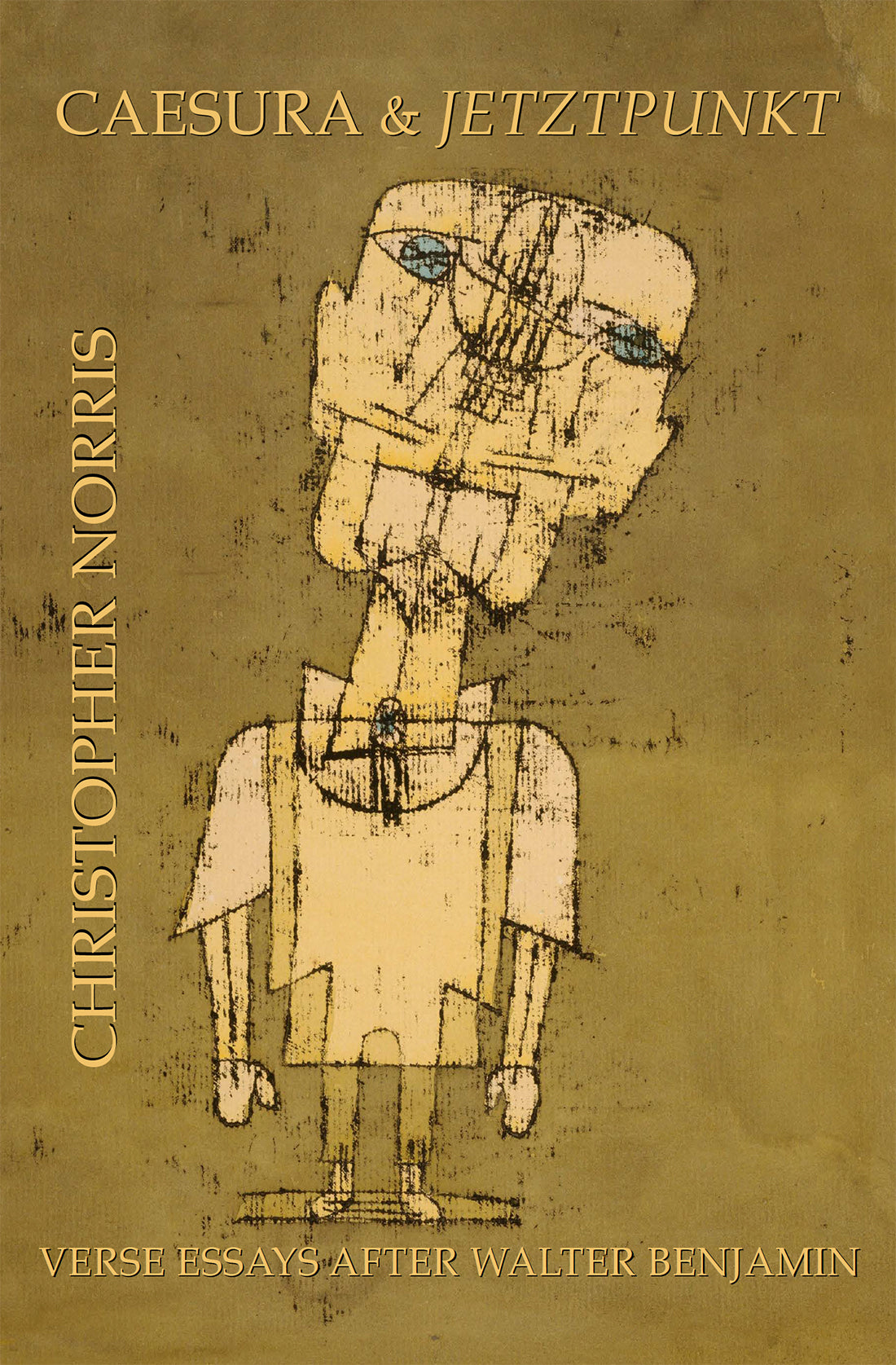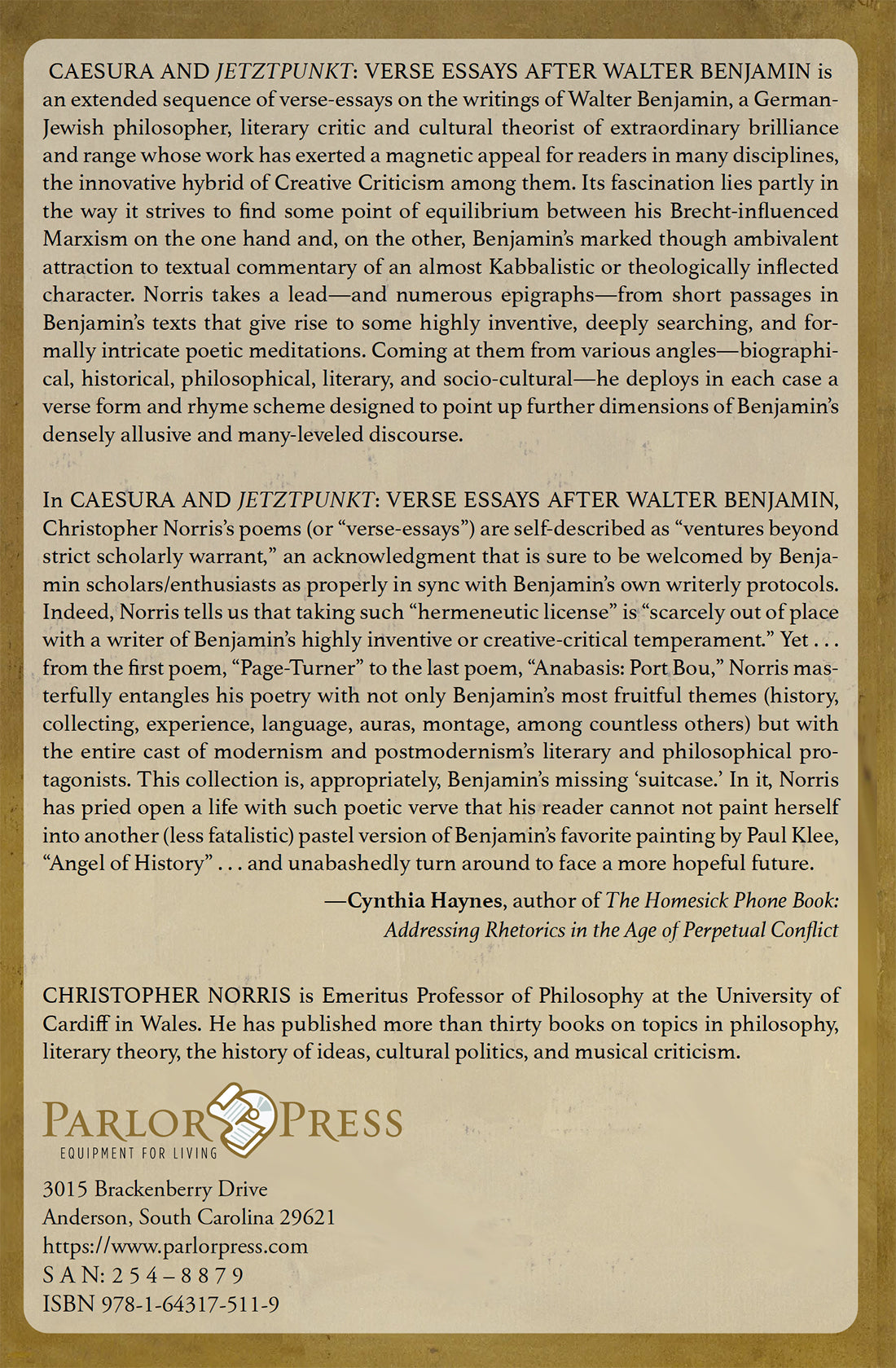Description
Christopher Norris
Information and Pricing
978-1-64317-510-2 (paperback, $19.95); 978-1-64317-511-9 (PDF, $9.95); 978-1-64317-512-6 (EPUB, $9.95) © 2025 by Parlor Press. 194 pages.
Bookstores: Order by fax, mail, or phone. See our "Sales and Ordering Page" for details.
What People Are Saying
In Caesura and Jetzpunkt: Verse Essays after Walter Benjamin, Christopher Norris’s poems (or “verse-essays”) are self-described as “ventures beyond strict scholarly warrant,” an acknowledgment that is sure to be welcomed by Walter Benjamin scholars/enthusiasts as properly in sync with Benjamin’s own writerly protocols. Indeed, Norris tells us that taking such “hermeneutic license” is “scarcely out of place with a writer of Benjamin’s highly inventive or creative-critical temperament.” Yet . . . from the first poem, “Page-Turner” to the last poem, “Anabasis: Port Bou,” Norris masterfully entangles his poetry with not only Benjamin’s most fruitful themes (history, collecting, experience, language, auras, montage, among countless others) but with the entire cast of modernism and postmodernism’s literary and philosophical protagonists. This collection is, appropriately, Benjamin’s missing ‘suitcase.’ In it, Norris has pried open a life with such poetic verve that his reader cannot not paint herself into another (less fatalistic) pastel version of Benjamin’s favorite painting by Paul Klee, “Angel of History” . . . and unabashedly turn around to face a more hopeful future. —Cynthia Haynes, author of The Homesick Phone Book: Addressing Rhetorics in the Age of Perpetual Conflict
Description
Caesura and Jetztpunkt: Verse Essays after Walter Benjamin is an extended sequence of verse-essays on the writings of Walter Benjamin, a German-Jewish philosopher, literary critic and cultural theorist of extraordinary brilliance and range whose work has exerted a magnetic appeal for readers in many disciplines, the innovative hybrid of Creative Criticism among them. Its fascination lies partly in the way it strives to find some point of equilibrium between his Brecht-influenced Marxism on the one hand and, on the other, Benjamin’s marked though ambivalent attraction to textual commentary of an almost Kabbalistic or theologically inflected character. Norris takes a lead—and numerous epigraphs – from short passages in Benjamin’s texts which give rise to some highly inventive, deeply searching, and formally intricate poetic meditations. Coming at them from various angles – biographical, historical, philosophical, literary, and socio-cultural—he deploys in each case a verse form and rhyme scheme designed to point up further dimensions of Benjamin’s densely allusive and many-leveled discourse. What we are offered here is a text that eludes easy classification by combining poetry, poetics, and philosophy of language and doing so, moreover, in a performative mode uniquely suited to a writer like Benjamin who himself very deliberately crossed all manner of generic border-lines.

About the Author
CHRISTOPHER NORRIS is Emeritus Professor in Philosophy at the University of Cardiff. He is the author or editor of more than forty academic books on aspects of philosophy, literature, the history of ideas, politics, and music. Among his chief interests are the poetry and criticism of William Empson and the writings of Jacques Derrida and Alain Badiou.
He has also published a number of poetry collections: The Cardinal’s Dog; For the Tempus-Fugitives; The Matter of Rhyme; A Partial Truth; As Knowing Goes; Hedgehogs: Verse Reflections after Derrida; Damaged Life: Poems after Adorno’s Minima Moralia; Socrates at Verse; Recalibrating and Other Poems; After Rilke: Renderings, Parodies, Rejoinders and Animadversions; and A Listener and Other Poems about Music. His political verse has appeared in three volumes: The Trouble with Monsters, The Folded Lie, and Convulsions, 2021–2024: A Trusstercluck.
He has lectured, given poetry readings, and held visiting posts at numerous universities in countries including the UK, the US, China, Canada, India, Spain, South Korea, Japan, Germany, South Africa, Morocco, Switzerland, Egypt, Serbia, Ireland, and Fiji. A previous verse collection of his was a Times Literary Supplement "Book of the Year" (Terry Eagleton’s choice), and he has now become very much involved in the innovative field of Creative Criticism.


